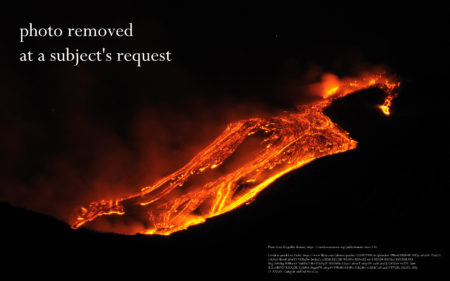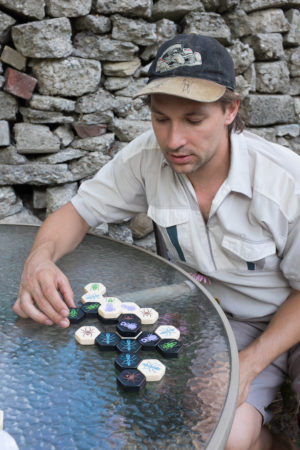Month: August 2016
Fix it with a fire tornado
Somehow, this article seems indicative of the low quality of a lot of our thinking about environmental issues: Mesmerizing ‘blue whirl’ from fire tornado could be cleaner solution for oil spills: Scientists discover clean-burning blue flame while simulating a fire tornado in the lab.
It seems a particularly questionable application of the idea that technology can correct environmental problems. Calling fire tornadoes used to burn up oil spills “remediation” stretches the bounds of both vocabulary and plausibility.
Basil and company
The lethal ladybug
The danger of reading the news too often
I have been listening to an audiobook of Nassim Nicholas Taleb’s: Fooled by Randomness: The Hidden Role of Chance in Life and in the Markets. It’s full of interesting concepts and engaging writing.
In one passage, Taleb describes the anxiety of the investor who feels the need to constantly check on how well an investment is doing. Has the value risen or fallen over the last month? Day? Minute? Second?
He describes a number of statistical and psychological features of such situations, but one seems possible to apply to estimating the ideal frequency of news-checking.
Taleb argues that with the investment, we generally see smaller jitters in value when we choose to look up the current value more often. Furthermore, and critically, we are likely to suffer more every time we see a drop in value than we are to celebrate when we see a gain — one of the ways in which people are demonstrably not ‘rational’ in the sense of valuing mathematically identical outcomes differently for emotional reasons.
Something similar may accompany the temptation to open a browser window to check Google News, open Twitter on your phone, glance at Facebook, or otherwise deliberately seek a new set of general updates about the broader state of the world. Given additional biases in the media, the odds are probably under 50% that any news story you have not seen before will be ‘positive’, at least for people who prefer a minimum amount of violence and suffering in the world. In particular, because violence is so emotionally salient to us, it tends to both dominate media coverage and draw the most attention when mixed in with other types of news stories.
If we feel the ‘losses’ in human welfare more acutely than the gains, checking for updates too frequently may lead us to develop and maintain an overly discouraged perspective on the world. This becomes even more likely when we take into account the seemingly irrational way in which our brains excessively prioritize what seems to be happening right now. Reading about the ongoing active shooter situation, with new updates coming in all the time, may be fundamentally more traumatizing than reading about the whole incident once it has been resolved (or at least moved to the next stage — the arrest, the trial, the post-massacre political analysis).
Perhaps it makes sense to intentionally curtail time spent following current news in favour (at least) of waiting for the summary (if any) in a weekly news magazine or, even better, working through the pages of a dusty book that has influenced the thinking of many people.
A strong first game
The history of the Arab Spring
The New York Times has published an exceptional long article by Scott Anderson about the history of the Middle East since 2003. It’s an ambitious text to have written, not a trivial task to read, and perhaps a suggestion that print journalism is enduring in its dedication to telling complicated stories, despite ongoing challenges to the business model and staffs of many of the most important print sources. It also includes some remarkable photography by Paolo Pellegrin.
A summary, early in the article, attributes special importance to the post-Ottoman settlement:
Yet one pattern does emerge, and it is striking. While most of the 22 nations that make up the Arab world have been buffeted to some degree by the Arab Spring, the six most profoundly affected — Egypt, Iraq, Libya, Syria, Tunisia and Yemen — are all republics, rather than monarchies. And of these six, the three that have disintegrated so completely as to raise doubt that they will ever again exist as functioning states — Iraq, Syria and Libya — are all members of that small list of Arab countries created by Western imperial powers in the early 20th century. In each, little thought was given to national coherence, and even less to tribal or sectarian divisions. Certainly, these same internal divisions exist in many of the region’s other republics, as well as in its monarchies, but it would seem undeniable that those two factors operating in concert — the lack of an intrinsic sense of national identity joined to a form of government that supplanted the traditional organizing principle of society — left Iraq, Syria and Libya especially vulnerable when the storms of change descended.
This accords closely to Middle Eastern history as interpreted by many of the sources we read in my Oxford M.Phil. In particular, it reminds me of David Fromkin’s A Peace to End All Peace: The Fall of the Ottoman Empire and the Creation of the Modern Middle East.
The AC dilemma
After many shorter spans which left us sweating in our third floor rooms, Toronto is now immersed in the longest and most intense heat wave of the summer so far.
This leaves me feeling awkward about actually owning an air conditioner, which I have never moved from its storage location in our living room. During my long search for accomodation, I saw many, many deeply unappealing, distant, and overly expensive rooms. When the chance to rent this one arose, I wanted to do everything possible to avoid somehow losing this one. So, when the previous inhabitant wanted to sell me his furniture (as well as most of the furniture in the common areas) I was willing to do so at the prices he initially suggested. That’s how I ended up with a $150 air conditioner which fits in my window but which I have never turned on.
My reluctance is entirely about the energy use and associated greenhouse gas emissions. Remarkably, in a city that goes below -20 ˚C in winter, Toronto’s highest energy demand is during hot summer days when everyone turns their air conditioning on. This isn’t so remarkable really, in part because cooling is fundamentally less efficient than heating. Turning electricity into heat is essentially a 100% efficient process. By contrast, refrigeration requires the inefficient compression of a coolant (producing heat as an unwanted by-product) which is then expanded in the area to be cooled and circulated elsewhere to be re-compressed and release the heat it has absorbed into the outside environment.
Perhaps worst of all is that when energy demand peaks, Ontario cannot produce enough electricity from low-carbon sources including large-scale hydroelectric and nuclear — instead turning on natural gas ‘peaker’ plants that would not otherwise run, like the Portlands Energy Centre.
Another oddity is that, for renters like us, electricity bills are paid by the landlord. Cooling would thus have no associated financial cost for me.
There are arguments in favour of me using AC. At the best of times, summers carry a danger of being inefficient doldrums. Without the structure asociated with teaching tutorials, regular meals at Massey, regular contact and communication with colleagues, and all the other motivating accompaniments of the school year, it can be easy to become unproductive. This is even more true when it is too hot to sleep, or even to sit in my room reading or doing research in a productive way.
I do have fairly easy access to cooled work areas at Massey College and Robarts Library, and that has been my chief means of escaping the heat.
This particular wave is meant to break over the next few days. I am greatly looking forward to the fall, which I think may be my favourite season in this part of the world. As in Ottawa, it provides an enjoyably span of pleasantly cooler and cooler days. Even the depth of winter is far preferable to mid-summer, in my eyes. I can always break out the wool long underwear, and wearing coats is often convenient for carrying things. By contrast, summer often leaves us with worsening the climate change plight of everyone in the future as our only means of avoiding the discomfort of heat and humidity right now.
As for the air conditioner, I can’t sell it because that would certainly lead to it being frequently used. Perhaps the best option is to find somewhere that can remove the coolant, since they are powerful greenhouse gases when they leak, and recycle as much of the rest of the device as possible.
Second term US defense secretaries
Finally, and very subjectively, there is an inauspicious storyline surrounding second-term secretaries of defense: none has ever finished his second term, each having been asked by the president to leave before his term was over. I believe that this is not coincidence; that there is something about this particular job that causes it to go sour before eight years elapse. Perhaps it is the pressure of signing the deployment orders that send our military personnel on dangerous missions from which they might not return. (I always approached this signing in a highly personal way, trying to understand how things could go wrong, and how military families would be affected; to keep a close personal tie to this awesome decision, I insisted on using my real signature – no auto-signing.) Perhaps it is the highly emotional meetings with families of soldiers killed while performing a mission at your direction. Or perhaps it is the tendency to catch “Potomac fever” – the affliction that, in time, leads defense secretaries to believe that all the attention they are getting is because of who they are, rather than the position they hold, and sometimes fostering an inability to maintain a sense of proportion while dealing with the enormous power they exercise. Whichever of these reasons – or combinations of reasons – is the culprit, the history is compelling.
Perry, William. My Journey at the Nuclear Brink. Stanford Security Studies. 2015. p. 142 (paperback)






